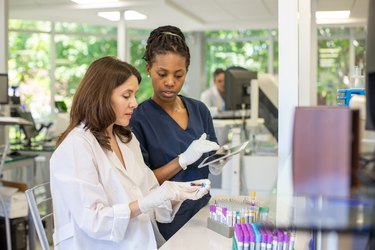
High cholesterol can pose hazards to your heart health, which is why doctors regularly check cholesterol levels. Though a cholesterol check involves a simple blood test, you may wonder how to prepare: Should you fast? Can you drink anything? Will a bad meal the night before affect your results?
Read more: 5 Factors That Affect Cholesterol Tests
Video of the Day
Video of the Day
Cholesterol Testing: What's Involved
According to the American Heart Association, the blood test you have will check:
- Overall cholesterol
- High-density lipoprotein (HDL) cholesterol, referred to as the good or healthy type of cholesterol
- Low-density lipoprotein (LDL) cholesterol, often called bad cholesterol
- Triglycerides, a type of fat in the blood
Most doctors suggest that you avoid eating or drinking anything other than water for 8 to 12 hours before your blood test.
Eating within the time frame you're supposed to fast could affect the HDL reading from your cholesterol test, says Grace Derocha, RD, a dietitian and certified diabetes educator at Blue Cross Blue Shield of Michigan. Additionally, any food and drink could get into your bloodstream and alter your results, according to the U.S. National Library of Medicine. It's also possible that your morning cup of coffee — even black coffee with no sugar — could affect your test numbers.
You should also avoid smoking and gum chewing during a fast before a test, the U.S. National Library of Medicine says.
Another thing you'll want to avoid within a day or two before your cholesterol test is alcohol, Derocha advises. Although alcohol doesn't have cholesterol, it is processed in the liver. Your liver is an organ that naturally produces cholesterol, so having alcohol can make it work harder and provide slightly lower or higher cholesterol numbers, Derocha says. Alcohol also dehydrates you, which is something you don't want to happen before a cholesterol check.
The only thing you should consume during your fasting period is water. In fact, staying hydrated with water before a blood test makes it easier for lab workers to find your veins for a blood test.
Talk to your doctor if you have diabetes and worry that your blood sugar may get too low by fasting. Your doctor can advise you on how to handle any medications you usually would use during the fasting period.
If you do mistakenly eat or drink during the fasting period, let your health provider know, the U.S. National Library of Medicine says. You may need to reschedule your test.
Other Dos and Don'ts
If you have a regular exercise routine, you may wonder if your workout session will affect your cholesterol check. It can, which is why it's best to skip the workout at that time, Derocha says. She recommends no exercise during the full fasting period. Even just one exercise session could raise your HDL, or good cholesterol. That may sound favorable, but it actually masks your true HDL number.
What about eating and drinking before your fasting period? There are no particularly good or bad foods to eat before a cholesterol test, as long as you complete your fast as the doctor recommends. If you have a large, fatty meal the night before a cholesterol check, it won't affect your results, Derocha says. The only good thing to be sure you consume the night before and the morning of a test is water.
Read more: Can You Get a False High Cholesterol Reading?
One More Thing
When it's time to review your cholesterol test results, make sure you tell your doctor about any healthy lifestyle choices you've already made. This gives the doctor a chance to work with you and identify where you can improve to obtain the healthiest cholesterol numbers.
And if you haven't made any specific changes? Be honest about that as well, Derocha advises. The test results provide a chance to commit to a healthier lifestyle.
Read more: 97 High Cholesterol Statistics You Should Know
Is this an emergency? If you are experiencing serious medical symptoms, please see the National Library of Medicine’s list of signs you need emergency medical attention or call 911.